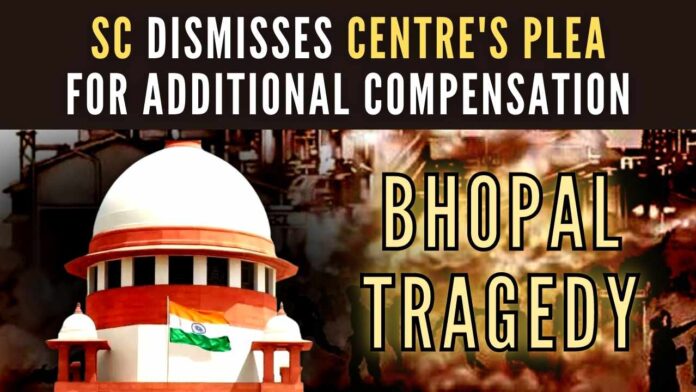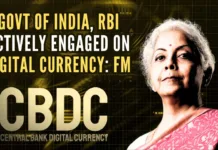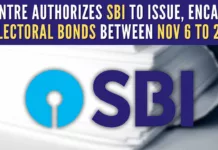
Bhopal tragedy: SC rejects more money for victims
The Supreme Court on Tuesday dismissed the Government of India’s curative plea seeking an additional Rs.7,844 crore from the Union Carbide Corporation‘s (UCC) successor firms to extend higher compensation to the victims of the 1984 Bhopal gas tragedy that left over 3,000 people dead and caused environmental damage. The top court also slammed the Centre for not framing an insurance policy for the victims in terms of its undertaking given to the court earlier and termed it as “gross negligence”. UCC’s successor firm is mainly Dow Chemicals.
“The responsibility was placed on the Union of India being a welfare state to make up for the deficiency and to take out relevant insurance policies. Surprisingly, we are informed that no such insurance policy was being taken out. This is gross negligence on the part of the Union of India and in breach of the directions issued by this court in the review judgment. The Union cannot be negligent on this aspect and then seek a prayer to fix the responsibility on the UCC,” the apex court said.
A five-judge constitution bench headed by Justice Sanjay Kishan Kaul said the Center had no rationale to rake up the issue two decades after the settlement. The top court said that a sum of Rs.50 crore lying with the RBI for the victims shall be utilized by the Union of India to satisfy pending claims of victims. The bench said the Union of India’s claim for a top-up has no foundation of legal principle.
“Either a settlement is valid or it is to be set aside in cases of fraud. No such fraud has been pleaded by the Centre and their only contention relates to several injuries and costs that were not contemplated at the time of the settlement. “It was known that medical facilities would have to be extended to rehabilitate people and there was bound to be environmental degradation. In fact, it is UCC’s allegation that the Union of India and the state did not proactively detoxify the site. In any case, this cannot be a ground to seek annulment of the compromise,” it said.
“We are equally dissatisfied with the Union of India for being unable to furnish any rationale for raking up the issue more than two decades after the incident. Even assuming that the figures of the affected victims turned out to be larger than expected, an excess amount of funds remain available to satisfy such claims. …We are of the view that curative petitions cannot be entertained,” the bench said.
The bench also comprising Justices Sanjiv Khanna, Abhay S Oka, Vikram Nath, and J K Maheshwar had on January 12 reserved its verdict on the Centre’s curative plea. The Centre wanted another Rs.7,844 crore from the UCC’s successor firms over and above the USD 470 million (Rs.715 crore) it got from the American company as part of the settlement in 1989. A curative petition is the last resort for a plaintiff after an adverse judgment has been delivered and the plea for its review is rejected. The Centre had not filed a review petition to rescind the settlement it now wants to be enhanced.
On January 12, the successor firms of UCC told the top court that the depreciation of the rupee since 1989, when a settlement was arrived at between the company and the Centre, cannot be a ground to now seek a top-up of compensation for the victims of the Bhopal gas tragedy.
The firms had told the top court that the Government of India never suggested at the time of the settlement that it was inadequate. The top court had, during the hearing, told the Centre that it cannot act like a “knight in shining armour” and decide the curative plea seeking additional funds from UCC as a civil suit, and asked the government to “dip into its own pocket” to provide enhanced compensation.
The UCC, now owned by Dow Chemicals, gave a compensation of USD 470 million (Rs.715 crore at the time of settlement in 1989) after the toxic methyl isocyanate gas leak from the Union Carbide factory on the intervening night of December 2 and 3, 1984 killed over 3,000 people and affected 1.02 lakh more.
The survivors of the tragedy have long been fighting for adequate compensation and proper medical treatment for ailments caused by the poisonous gas leak. The Government of India had filed the curative petition in the apex court in December 2010 for enhanced compensation. On June 7, 2010, a Bhopal court sentenced seven executives of Union Carbide India Limited (UCIL) to two years imprisonment.
The then UCC chairman Warren Anderson was the prime accused in the case but did not appear for the trial. On February 1, 1992, the Bhopal CJM court declared him an absconder. The courts in Bhopal had issued non-bailable warrants against Anderson twice in 1992 and 2009 before his death in September 2014.
On June 7, 2010, after more than 25 years, Bhopal CJM holds guilty all the eight accused persons including Union Carbide’s Indian partner Mahindra Group’s Chairman Keshub Mahindra, and convicted them to two years of jail term along with a fine (under section 304A IPC). Others found guilty were Vijay Gokhle, the then managing director of UCIL, Kishore Kamdar, the then vice president, J N Mukund, the then works manager, S P Choudhary, the then production manager, K V Shetty, the then plant superintendent, and S I Quereshi, the then production assistant. However, all eight convicts were granted bail.[1]
Reference:
[1] Bhopal gas tragedy: Keshub Mahindra, 7 others convicted – Jun 07, 2010, MoneyLife
PGurus is now on Telegram. Click here to join our channel and stay updated with all the latest news and views
For all the latest updates, download PGurus App.
- Prime Minister Narendra Modi: A Gujju businessman who does not invest his precious time for a losing battle - April 13, 2024
- NIA arrests two accused Shazib and Taahaa in Bengaluru’s Rameshwaram Cafe blast case from Kolkata - April 12, 2024
- National Herald scam: Adjudicating Authority upholds Rs.752 crore assets attached by ED - April 11, 2024










